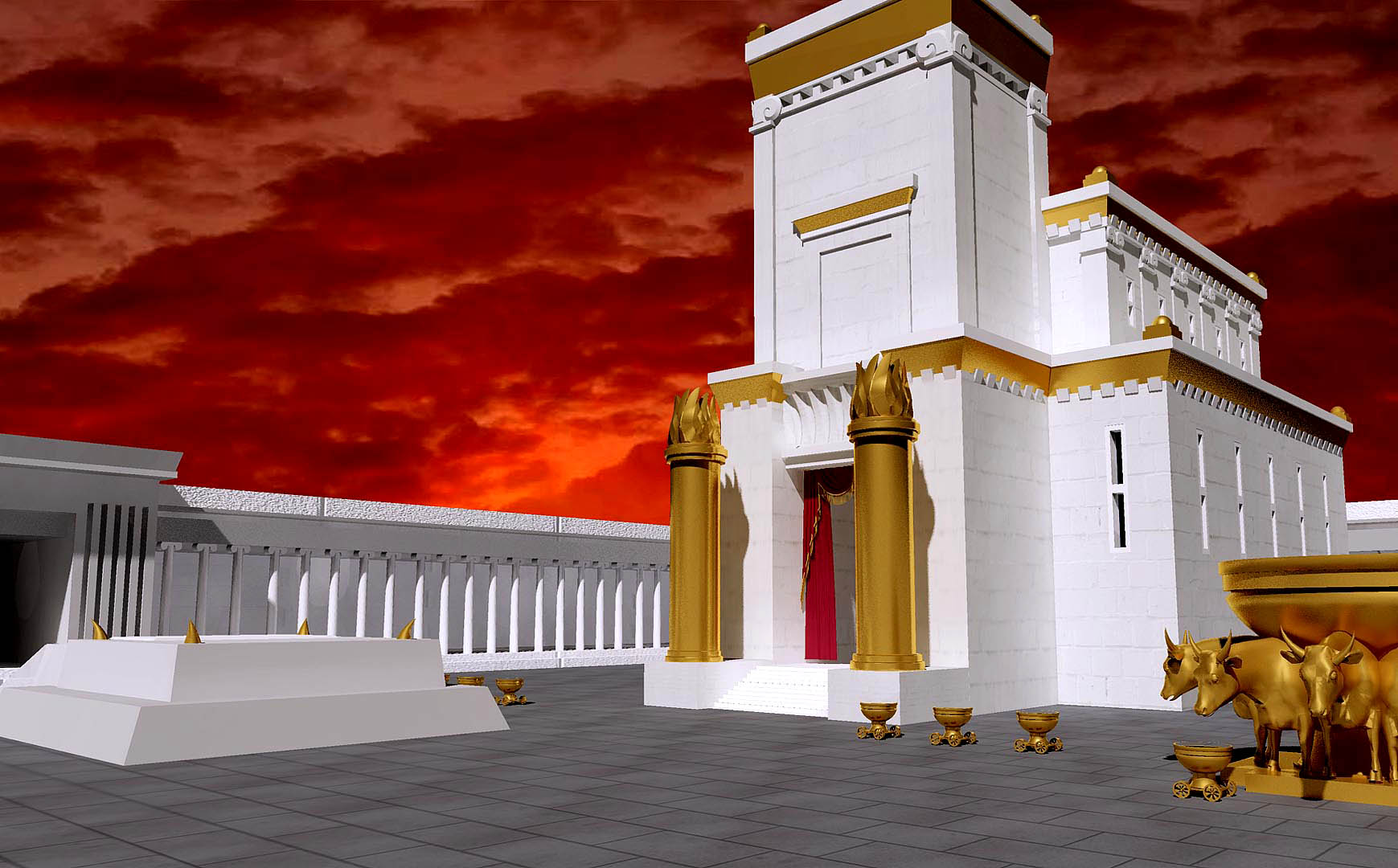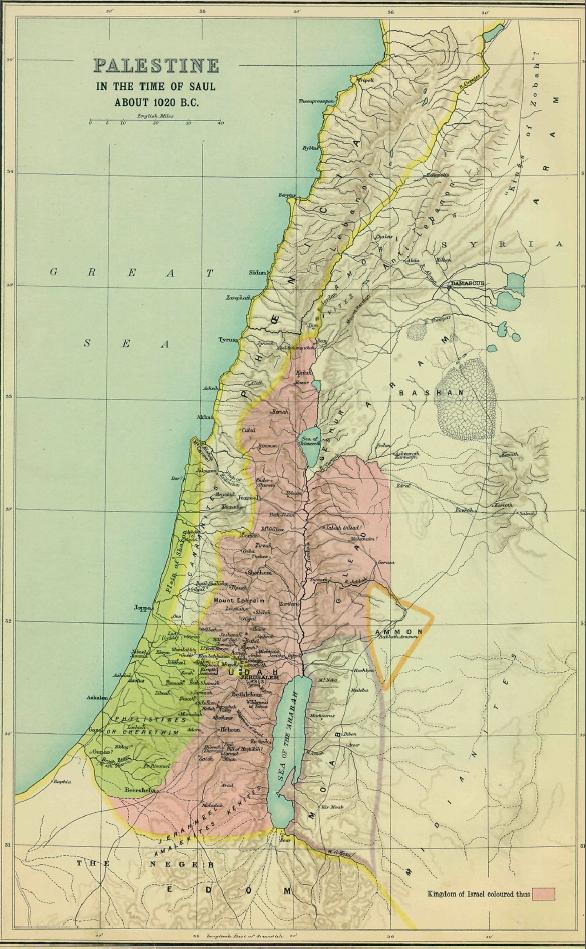The following is an excerpt (Chapter VI, pages 58-63) from Ancient and Medieval History (1946) by Francis S. Betten, S.J. Although some information may be outdated, the Catholic historical perspective it provides remains pertinent. Use the link at the bottom of post to read the previous/following pages. Use the Search box above to find specific topics or browse using the Resources tab above.
THE HEBREWS AS ONE UNITED PEOPLE
59. The Time of the Judges. — In their new abodes, the people at first were without any political central authority. Each community had local government. It was during this period that on account of their many violations of the covenant, chiefly by idolatry, God allowed portions of the people to be oppressed by the surrounding races, especially by the powerful Philistines. When they returned to Him in sorrow and contrition, He often raised up among them men of great bravery and capability, who freed them from their enemies. These men retained their influence even after peace was restored and acted as rulers and Judges. Hence this period is called the time of the Judges. They did not represent a stable institution and none of them controlled the whole people. The only strong bond during this time of political weakness was unity of religious belief, a centralized priestly organization, and yearly pilgrimages to the Holy Tabernacle that had accompanied their fathers through the desert.
60. The First Kings, Saul, David, Solomon. — The last of the judges was Samuel. To him the ancients signified repeatedly that the nation wished to have a king like the races around them. Finally, inspired by God, he anointed Saul king of His people. Saul, however, although he won great victories over their enemies, was ultimately rejected, because he arrogated to himself priestly privileges.

God now selected David, a shepherd boy, who became the most powerful king (1011-971). He succeeded in completely unifying the nation and in extending its boundaries from the Red Sea to the Euphrates. He fortified and beautified the city of Jerusalem, which he made his capital; perfected the organization of the priesthood; and enriched the Hebrew literature with the Psalms, the greatest lyric poems of the world. As a reward for his zeal in the service of God, he received the solemn promise that the Redeemer of the world would come from his family, and that, if his descendants remained faithful to God, they would be forever preserved in their royal power.
David’s son, Solomon (971-929), was famous for his wisdom. With the aid of Phoenician workmen he built the splendid temple of Jerusalem, the center of divine worship for the nation. He also erected a magnificent royal palace, and by his commercial connections with foreign countries enriched the whole people. The first part of his reign is the most glorious period of the history of Israel. As the years passed on the heavy taxes made necessary by his extravagance and luxury embittered his subjects and made them ripe for revolt. Moreover, though polygamy was not forbidden by the Mosaic law, Solomon, contrary to the law, took wives from pagan nations, who eventually perverted his heart, so much so that he even built temples to their gods and took part in their sacrifices. Consequently, a prophet announced to him that he had forfeited God’s favor, but for the sake of David his father, the destruction was not to come in his own days; nor would the house of David be entirely deprived of its kingdom.
THE HEBREWS AS TWO SEPARATE KINGDOMS
61. Division of the People. — After Solomon’s death, ten of the tribes separated themselves from Roboam, his son. Juda alone, with the insignificant tribe of Benjamin, remained faithful to the hereditary ruler. Jeroboam, a commander of the army, who had fled the country under Solomon, was proclaimed king by the ten tribes. Thus, after 929 B.C., the nation was divided into the northern kingdom of Israel, with Samaria as capital, and the southern kingdom of Juda, with Jerusalem as capital.
62. The Kingdom of Israel and Its End. — In the kingdom of Israel idolatry became general, so that many pious Jews, especially priests, emigrated to Juda. Jeroboam erected golden calves at Dan and Bethel, the northern and southern points of his kingdom, and invited his subjects to worship them. The fiery zeal of the prophet Elias alone prevented Israel from bending the knee to Baal, the Phoenician sun god. The kingdom lasted 252 years. It had in all nineteen kings, belonging to nine different dynasties; seven of these dynasties were entirely rooted out by those who succeeded them. One king reigned but a few months, another a few days. Only a single king, Jehu, showed true zeal for the Law, and even he tolerated the worship of the golden calves, although he abolished that of Baal.
At the time when the Hebrew nation thus weakened itself, the great empires on the Euphrates and the Nile also were in a state of decline and showed little aggressiveness. The wars of the two Israelitic kingdoms recorded in Holy Scripture were waged between themselves and with the small nations around them. But after Assyria had recovered under the usurper Pul (§ 48), it at once began a policy of extension and soon its boundaries reached as far as the confines of Israel. In 722 B.C. Salmanassar and his successor Sargon II conquered Samaria and led the king Osee with almost the whole people into captivity. The captives were settled in the most distant districts of the Assyrian Empire. These, “the Lost Ten Tribes,” never returned to the land of their fathers. Colonists were sent to repeople the deserted land; they fused with the remaining Israelites, and thus produced the half-pagan population of the Samaritans.
63. The Kingdom of Juda, though much smaller, enjoyed greater advantages in possessing the national temple and with it the center of the priesthood, and in havi dds ng the family of the greatest kings as its rulers. It lasted nearly four hundred years, and in this time had twenty kings, all of the house of David. Only for five years a woman, the pagan Athalia, a cruel tyrant, held the reins of government. She destroyed the whole royal family with the sole exception of one child, Joas, who was for some time concealed in the temple. Not all of the twenty kings were truly religious. The last four practiced paganism openly and showed a supreme contempt for the religion of David, their great ancestor.
64. Destruction and Restoration. — Nabuchodonosor, king of the second Babylonian Empire (§ 50), destroyed Jerusalem and the kingdom. He first made Juda tributary. Several times it rose against him, and as early as 606 B.C. he led away the foremost men into captivity. Finally, he appeared with a strong army before the walls of Jerusalem and took it after a siege of several years in 586 B.C. King Sedecias saw his own sons slain before him; then his eyes were put out, and laden with chains he was carried to Babylon, where he died in prison. The Babylonians utterly destroyed the splendid city; the king’s palace and the magnificent temple sank in ashes; the people, save poor vinedressers and husbandmen, were forced to emigrate to the Euphrates.
The prophet, Jeremias, had foretold this catastrophe and warned king and priests and people for years. Persecution was his reward. He was permitted to stay with the miserable remnant of the population. It was then that he sang over the ruined city those touching lamentations which resound in our churches every year during Holy Week.
“How doeth the city sit solitary that was full of people!
How is the mistress of the nations become a widow!
How is the queen of provinces become tributary!
The ways of Sion mourn, because none come to her solemnities,
All her gates are broken,
Her priests sigh,
Her virgins are in affliction,
And she herself is oppressed with bitterness.
All ye that pass by the way attend and see,
If there be any sorrow like to my sorrow.”
This severe chastisement had a lasting effect. In their captivity the people again turned to God. Their greatest desire was to go back to the land of their fathers, and to rebuild the temple and the Holy City. After fifty years this desire was fulfilled. As soon as Cyrus, king of Persia, had made himself master of Babylon, he allowed the Jews to return. A large number availed themselves of this permission. Jerusalem and the temple rose from their ruins. The land was now a Persian province. The Persian rule was mild; and many privileges distinguished this province from the rest of the empire (§§68, 178).
65. THE PLACE OF THE HEBREWS IN HISTORY. — The Hebrews have not contributed any invention or discovery or other advancement to the material culture of mankind. Theirs was an infinitely higher mission. They were to preserve a place in the wide world where the worship of the true God “Who made heaven and earth” would never cease, and where the promised Redeemer would find a starting point of His work. A special Providence watched over the little nation, and kept it from being crushed out of existence by overwhelmingly powerful neighbors before its mission was fulfilled. By constant and most flagrant violation of God’s Law, kings as well as people had indeed forfeited the claim to that independent national existence which God had promised to their ancestors. In view of their repentance, God did not take away from them their spiritual destination. Jerusalem was once more the holiest of cities, and the temple the most hallowed spot on earth. The land of Juda and the new little nation under Persian control were the only place where “wisdom dwelt.” Nor did the people again fall away from the God of Abraham, Isaac, and Jacob. But the house of David did not reascend the throne. It disappeared in obscurity until the time of “Joseph, the husband of Mary, from whom was born Jesus Who is called the Christ.”
The only contribution to general civilization by the Hebrews is in the line of intellectual attainments. Their literature, contained in the Bible, is such that even aside from its supernatural character it will ever command the attention of men. It not only furnishes a great amount of historical and philosophical truth, but has also given to the world the most sublime works of lyric poetry. (H. T. F., “Talmud.”)
We shall see, in its place, how this people came into contact with Alexander the Great; how it fared after his death; and how, after rejecting the Messias, it ceased to exist as a state, and was dispersed among the nations of the earth.


